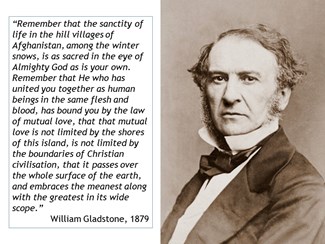“Just remember this. One Eva Smith has gone – but there are millions and millions of Eva Smiths and John Smiths still left with us, with their lives, their hopes and fears, their suffering and chance of happiness, all intertwined with our lives, and with what we think and say and do. We don't live alone. We are members of one body. We are responsible for each other. And I tell you that the time will soon come when, if men will not learn that lesson, then they will be taught it in fire and blood and anguish.”
from ‘An Inspector Calls’ by JB Priestley
Anyone who watched the spectacle of the House of Commons debate last Wednesday, casting blame in all directions but their own for the tragedy of Afghanistan, might well have been stirred by a sense of personal sadness and responsibility which so many are experiencing at this time.
On Thursday evening, BBC4 broadcast the television production of ‘An Inspector Calls’, based on the play by JB Priestley. Set in 1912 - just before the First World War - it uses the symbolism of individual responsibility within an affluent family for a girl’s suicide. The most striking extract is in the quotation above, when the inspector draws a direct link to the impending tragedy of the Great War in which so many millions lost their lives.
This is indeed a dangerous time, as The Bigger Picture and many others have commented over the past few days. It's a time which calls for steady heads and careful judgement in order to avoid what's already bad becoming a lot worse.
The cast of characters in ‘An Inspector Calls’ includes most of our human weaknesses: the self-righteous bully, the short-tempered socialite, the do-gooder whose motivations are not entirely selfless, the lack of compassion, and the rapist and thief. They’re all quick to disclaim responsibility, and the twist at the end of the play shows that, notwithstanding the clear evidence of their failures, they are also quick to breathe a sigh of relief and carry on as if nothing has changed.
It is a cleverly-constructed plot, and the inspector’s statement makes the wider dimension crystal clear.
 The Taliban, the terrorists, the liberating West – we’ve all added to the string of disasters which have afflicted Afghanistan over the past centuries. No wonder William Gladstone spoke as he did in 1879, but we have taken little heed of his words.
The Taliban, the terrorists, the liberating West – we’ve all added to the string of disasters which have afflicted Afghanistan over the past centuries. No wonder William Gladstone spoke as he did in 1879, but we have taken little heed of his words.
And now the world is asking - how does this affect so many other parts challenged by authoritarian regimes: such as Taiwan, the South China Sea, Ukraine, the Middle East? If, as we said last week, this withdrawal from Afghanistan reflects an inevitable acceptance of an indefensible reality, how can the West show its resolve not to allow advantage to be taken in so many other areas?
That's the challenge, and it won't be easy to communicate the necessary message. Biden needs to make doubly clear now that his message ‘America is back’ is not to be interpreted as hollow rhetoric.
But we also need to challenge the authoritarian bullies, whether political or religious, on points of principle; and that means taking a lead from the core teaching of the Christian faith to which we referred to a fortnight ago, and whose journey over the past centuries has in so many ways re-captured the essence of Jesus’s teaching and life on earth.
Is it too much to hope that all can learn from the shock of the past few days: or will the world breathe a sigh of relief like Priestley's characters when the media headlines have moved on?
This is indeed the time to re-examine our consciences carefully, both collectively and individually.
Gavin Oldham OBE
Share Radio

